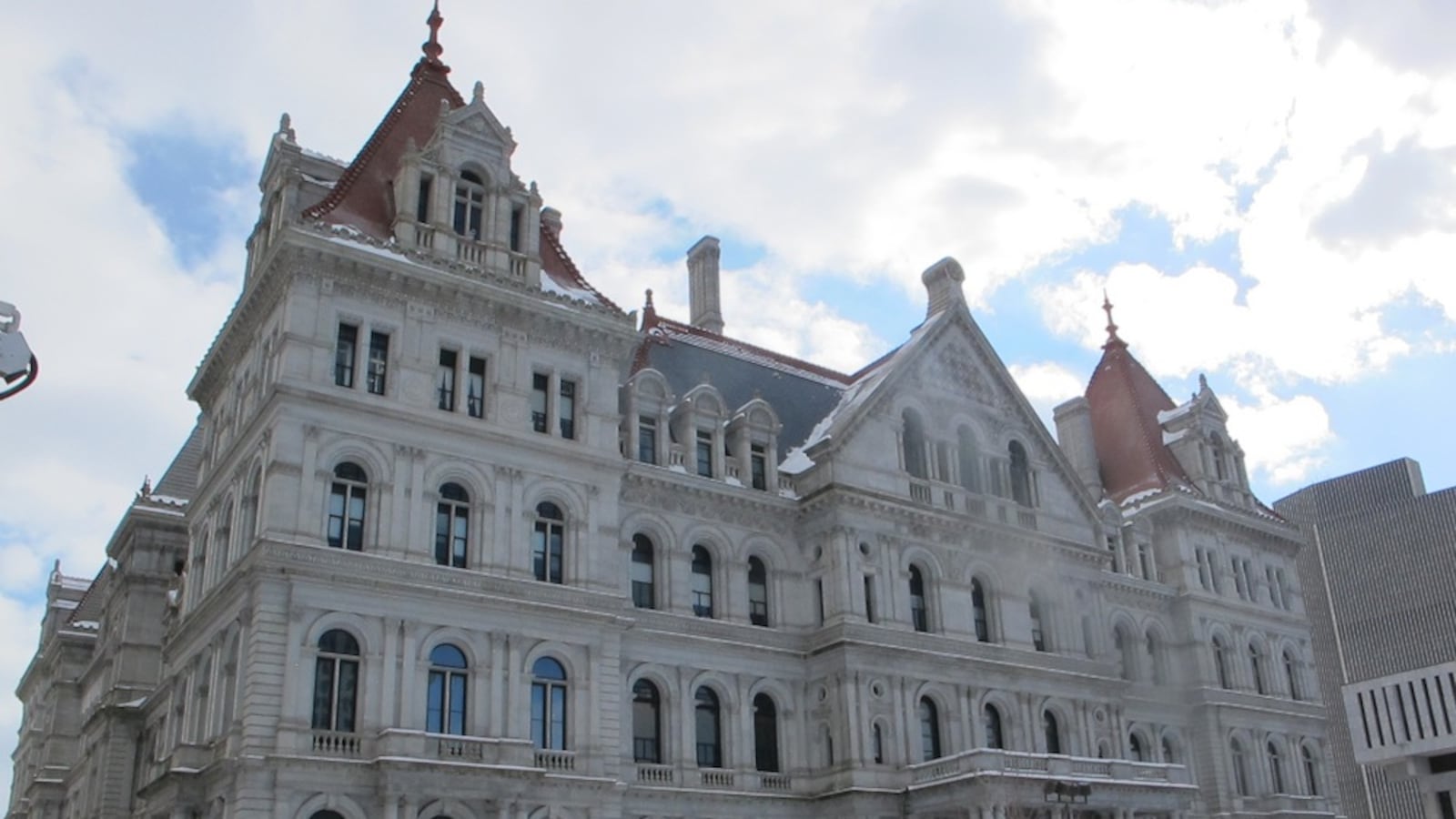Updated, 11:25 p.m. New and expanding charter schools in New York City will get access to facilities funding, but existing charters already in private space will receive less aid, according to people briefed the framework of a state budget deal.
The deal also includes extra per-pupil aid for all charter schools, which would come from the state and be spread out over three years—an increase that would break several years of flat funding.
Legislators are still hammering out the final pieces of the state budget legislation and aren’t expected to submit a final budget until Friday. But they have come to an agreement on some major issues relating to charter school space-sharing problems, a centerpiece of the year’s negotiations.
The deal puts New York City on the hook to find space for charter schools in city buildings, something that the Bloomberg administration offered to about two-thirds of the city’s 183-school charter sector without a legislative imperative. If the city can’t or does not want to work out a co-location arrangement, it will have to pay schools extra so that they can afford to rent and operate in private space, according to the terms of the deal, the sources said.
A third-party arbitrator would make a final ruling if the city and a charter school disagrees over a co-location plan.
Those changes would be significant at a time when the de Blasio administration has dramatically tempered the Bloomberg administration’s enthusiasm for co-location. Earlier this month, it rolled back three space-sharing plans for Success Academy charter schools, although it also allowed several others to proceed.
De Blasio’s shift against charter schools ignited a public relations battle waged by Success CEO Eva Moskowitz and other charter school advocates. Their campaign received a lift from Gov. Andrew Cuomo, who promised to “save” the sector so that it could continue to grow.
The following week, the State Senate’s budget proposal included a package of pro-charter school bills aimed at ensuring that the schools didn’t have to pay facilities costs out of their operating budgets.
One of those proposals, to offer privately-housed charter schools a share of state building aid, was not included in the deal, apparently getting yanked off the table as recently as yesterday. That will affect the city’s 68 charter schools in private space, as well as all 57 charter schools outside of the city in private space.
The omission disappointed advocates who hoped these schools, which put together serve about 45,000 students, would get more facilities help.
“We are happy to see that new charter schools in New York City will have access to space, but it’s unfortunate that schools in private space, both in the city as well as across the state, received nothing under this deal,” said Northeast Charter Schools Network President Bill Phillips. “Their needs were just as severe.”
Charter schools in private space, because they must pay for facilities costs out of their operating budgets, have less money to use on educational programs. In New York City, the gap between district and co-located charter schools is about $3,500 and ranges from less than $1,000 to close to $3,000 elsewhere in the state.
“Those schools in private space have, in effect, been subsidizing the education of kids in the city,” Phillips added. “They’ve been paying for their own building and they got no help in this deal.”
The budget deal has one upside for all charter schools in the state, no matter where they are housed. Charter schools will receive an overall $500 increase in per-pupil funding over the next three years, starting with $250 next year. The funding will come from the state, saving de Blasio and from incurring new costs at a time when he is negotiating retroactive raises for the city’s teachers and planning a massive expansion of pre-kindergarten and after-school programs.
The state will pay $125 per charter school student in the second year and $125 in the final year (A larger increase, which a spokesman for Speaker Sheldon Silver confirmed, was in the original version of this article). In just New York City, that would cost the state nearly $50 million based on the city’s charter school enrollment projections. Enrollment is estimated to grow from about 70,000 this year to 125,000 in three years. There are another 20,000 charter school students outside of New York City.
But New York City Charter Center CEO James Merriman said he saw it less optimistically. By his estimation, he said in a statement, the negotiated increase is worse off for charters than than the funding mechanism originally proposed in Cuomo’s budget proposal in January. That would have lifted a per-pupil funding freeze that had been held flat at $13,527 for the last three years.
Instead, the freeze was extended for an additional three years, which means that districts won’t have to divert money away from its portfolio of district schools. The state’s $500 increase is designed to partially compensate for that, but Merriman said it wasn’t enough.
Referring to comments made by Assembly Speaker Sheldon Silver to Capital New York on Thursday night, Merriman criticized that part of the deal.
“Speaker Silver’s assertion that the budget is a boon for charter schools and results in fair funding for charter and district schools, is highly misleading,” Merriman said in a statement.
The final budget is not yet complete and lawmakers are still hammering out details about what kind of access charter schools will have to pre-k funding, sources said. If lawmakers want to have the budget bill ready for an on-time vote on Monday, they must finalize the language by the end of the day on Friday.
But legislative leaders said that they were nearing the finish line. Senate co-leader Jeff Klein said that all that was left was wrapping up “technical details.”
“We’re very very close to an agreement in everything,” Klein said.
Correction: A previous version of this article incorrectly stated the total per-pupil increase that charter schools would receive under the state’s tentative deal.


